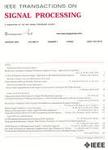版权所有:内蒙古大学图书馆 技术提供:维普资讯• 智图
内蒙古自治区呼和浩特市赛罕区大学西街235号 邮编: 010021

作者机构:Southeast Univ Natl Mobile Commun Res Lab Nanjing 210018 Peoples R China Natl Sun Yat Sen Univ Inst Commun Engn Kaohsiung 804 Taiwan Univ Calif Irvine Ctr Pervas Commun & Comp Irvine CA 92697 USA
出 版 物:《IEEE TRANSACTIONS ON SIGNAL PROCESSING》 (IEEE Trans Signal Process)
年 卷 期:2022年第70卷
页 面:4897-4911页
核心收录:
基 金:National Natural Science Foundation of China [61941104, 61921004] Key Research and Development Program of Shandong Province [2020CXGC010108] Fundamental Research Funds for the Central Universities [2242022k30005] Ministry of Science and Technology of Taiwan [MOST 111-2221-E-110-020-MY3]
主 题:Location awareness Channel estimation Signal processing algorithms Inference algorithms Estimation Delays Synchronization Channel estimation localization mmWave system soft information
摘 要:In millimeter wave (mmWave) communications, user position information can enable various position-based communication services, such as resource allocation, beam tracking and alignment, interference control, and synchronization. Classical localization methods focus on hard localization information, but soft localization provides the confidence levels in position estimates and thus enables the information to be efficiently fused with different measurements and application layers to realize integrated communication and localization. In this study, we propose a soft channel estimation and localization algorithm for an mmWave systems with multiple base stations. We present the Newtonized variational inference spectral estimation algorithm to extract soft information of position-related channel parameters. The soft localization algorithm estimates user position by using soft channel parameters from the expectation propagation simultaneous localization and mapping algorithm framework. The proposed algorithms realize channel estimation and localization in the communication process and refine the channel estimation through the localization information. Numerical results show that the proposed algorithms approach the Cramer-Rao lower bound for channel estimation and localization, and are thus verified to be effective.